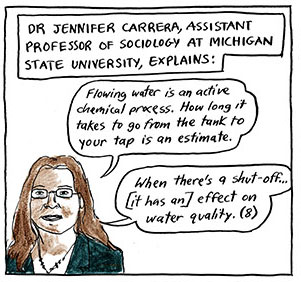
This story we’ve been telling this season, in this comics journalism series exclusive to Truthout, started for folks like Nicole Hill three years ago. For many across the nation and throughout the world, that was when concern for Detroit’s water crisis started — and ended. Focus shifted to Flint, Michigan, and the work of people like Melissa Mays, shortly thereafter. But as we saw last month, these threats to public health have barely been addressed in the courts in that time. What movement has been made to ensure water as a human — and as a statutory — right has largely happened through the tremendous efforts of civil rights attorneys like Detroit-based Alice Jennings.
But Michigan residents know that water crises in Detroit and Flint, as well as many of the neighboring towns and suburbs — have only worsened. New findings on the impact of the water shutoffs show they may have a significant impact on the health of the region. In fact, Detroit-based water warrior Monica Lewis Patrick suggests that the city’s profiteering is making people physically ill. Meet her, and some of the other folks involved in water rights, in “Making Us All Sicker,” the final strip in the water part of our Michigan water, land and housing series.

- “Officials: 400 Detroit water customers disconnected,” Christina Ferretti, The Detroit News, April 25, 2017. Accessed April 25, 2017. https://www.detroitnews.com/story/news/local/detroit-city/2017/04/25/officials-detroit-water-customers-disconnected/100885254/
- Ibid. Local groups suggest that service is staying shut off for an average of 48 hours, and Detroit Water and Sewerage Department has released no data to support their claim.
- “Detroit Area Economic Summary,” US Bureau of Labor Statistics, April 6, 2017. Accessed May 5, 2017. https://www.bls.gov/regions/midwest/summary/blssummary_detroit.pdf
- “Detroit’s latest US Census numbers: Good news or bad?” Nancy Kaffer, Detroit Free Press, May 19, 2016. Accessed May 8, 2017. https://www.freep.com/story/opinion/columnists/nancy-kaffer/2016/05/19/detroit-population-decline/84590056/
- “Architecture of Segregation,” Paul Jargowsky, The Century Foundation, August 7, 2015. Accessed May 8, 2017. https://tcf.org/content/report/architecture-of-segregation/
- “The Association Between Income and Life Expectancy in the United States, 2001-2014,” Raj Chetty, Michael Stepner, Sarah Abraham, et al., Journal of the American Medical Association, April 26, 2016. Accessed May 8, 2017. https://jamanetwork.com/journals/jama/article-abstract/2513561
- “The Impact of Geographical Water Shutoffs on the Diagnosis of Potentially Water-associated Illness, with the Role of Social Vulnerability Examined,” Alexander Plum, Kyle Moxley, Marcus Zervos, The Henry Ford Global Health Initiative, April 8, 2017. A request for an interview with the authors was denied, and the following statement supplied by Henry Ford Health Systems Media Relations Director Brenda Craig: “We’ve shared the results of our study with city officials and are thankful for their quick response. We are working in partnership with them on next steps and remain committed to the health and safety of the residents of the city of Detroit.”
- “Testing Water Quality” workshop offered by We the People of Detroit on March 25, 2017, Jennifer Carrera, Jade Mitchell, and Monica Lewis Patrick, Cass Corridor Commons, Detroit.
- Ibid.
Copyright Anne Elizabeth Moore and Melissa Mendes 2017.
Join us in defending the truth before it’s too late
The future of independent journalism is uncertain, and the consequences of losing it are too grave to ignore. To ensure Truthout remains safe, strong, and free, we need to raise $46,000 in the next 7 days. Every dollar raised goes directly toward the costs of producing news you can trust.
Please give what you can — because by supporting us with a tax-deductible donation, you’re not just preserving a source of news, you’re helping to safeguard what’s left of our democracy.